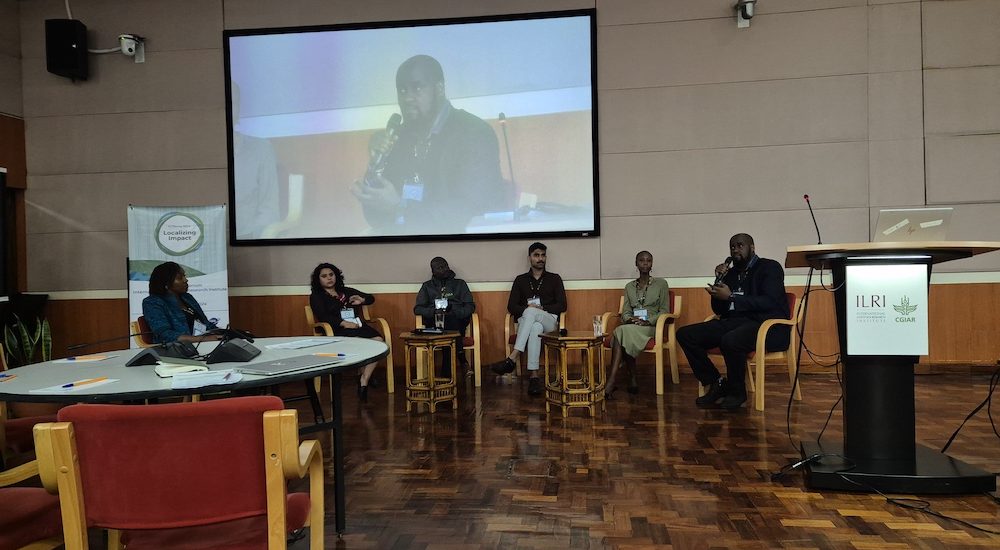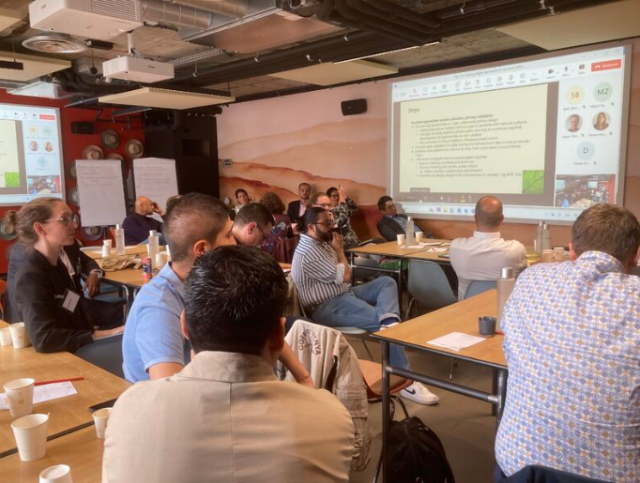Over the past few weeks, we’ve connected with individuals and organisations at the forefront of agriculture and technology. From Berlin to Nairobi, our journey has been filled with insightful discussions, innovative collaborations, and learning about the future of food systems. From Washington to the Netherlands to Nairobi, here’s a roundup of events we were a part of.
The Power of Youth, Tech, and Collaboration in Agriculture
Our co-designed digital platform Farm Direct is enabling market access for smallholder farmers. At the Future of Food and Beverage Conference in Amsterdam held in May, we presented, in a session led by our International Commercial Programmes Manager Jason Archie-Acheampong, focusing on how technology and innovation can bridge the gap and make farming a more attractive career path for young people. Alongside Ian Welsh from the Innovation Forum, they explored the exciting possibilities that tech holds for the future of agriculture.
Listen to reflections from the event on Jason’s interview here https://www.podbean.com/media/share/pb-knt3n-162f351?utm_campaign=wl_i_share_ep&utm_medium=dlink&utm_source=wl_i_share
Soil Health Summit in Nairobi
In a Soil Health Summit event held in Nairobi, the director of Briter and AgBase Programme Lead, David Saunders, presented the latest trends and developments in soil health innovation in Africa and Kenya. The discussions focused on understanding the barriers and opportunities to scaling the impact of soil health and fertility innovators in Africa. A key point of interest for us was how the data generated from these innovations can be shared back with farmers in actionable formats, to help in addressing the challenges they face in soil health, including agronomy and market challenges.
Embracing European Union’s Regulation on Deforestation-Free Products (EUDR)
The impact of EUDR is a pressing concern. At the Team Europe Initiative Workshop, we delved into the challenges and opportunities presented by EUDR. Producers Direct, led by Sarah Mackay and Claire Rhodes, alongside partners like GIZ and the International Coffee Organisation, unpacked the regulation’s implications for smallholders. While acknowledging the difficulties, they spoke about shaping a future where EUDR supports, not hinders, sustainable food systems.
ICTforAg: Localising impact through inclusion, inspiration, and innovation
With food demand projected to double by 2050, addressing challenges like climate change, gender and inclusion, and under-resourced extension services is essential. Digital platforms are emerging as crucial tools to overcome these challenges, offering localized solutions and personalised services for smallholders. The ICTforAg event held in May, highlighted the critical role technology plays in agriculture.
We participated as presenters in the Washington DC event and as virtual attendees in Nairobi and Mexico. In a breakout session, titled ‘Bringing Smallholder Farmers’ Voice to the Conversation’, our COO Katie Messick discussed our efforts in co-creating digital solutions with farmers in Peru and Colombia and emphasised the need to amplify smallholders’ voices and expertise. Key discussion points included lessons from Human-Centered Design, leveraging existing tech in rural areas, the role of AI, adoption challenges, user engagement, and ethical data practices.
Bayer Social Innovation Days: Empowering smallholder farmers
We participated in Bayer Social Innovation Days 2024. Our CEO, Claire Rhodes, highlighted our work with Farm Direct, a digital platform empowering smallholder farmers, especially women, through a digital cooperative model. Sharing insights, she highlighted how we are enabling market access for smallholder farmers and how farmers are improving their incomes.
Engaging at these events has been enriching. These events not only provided invaluable insights but also fostered meaningful collaborations for the future of smallholder farming. These conversations highlight our dedication to leveraging data, technology, and collaborative efforts to create sustainable and inclusive food systems. But our conversation doesn’t end here! We eagerly anticipate continuing these dialogues and exploring new opportunities to amplify the voices of smallholder farmers. Whether you’re attending these events or simply interested in learning more about our work, let’s connect and work together. Together, we can make a real difference!
Farmer-Centered Tech for Farmers: Insights from GDDF
We participated in the 5th Annual Global Digital Development Forum. This year’s forum emphasised the transformative impact of digital technology on global issues such as climate change and pandemic response. The sessions focused on community-driven discussions about the challenges and opportunities in digital development, highlighting the importance of a human-centered and ethical approach.
Our Fundraising Manager, Talia Lostaunau, shared a presentation on how we are leveraging technology to create a more sustainable future for smallholder farmers. Login to learn more from here presentation here: https://digitaldevforum.course.tc/t/gddf-2024/discussion/threads/leveraging-the-power-of-ai-and-big-data-to-truly-move-the-needle-on-meeting-the-sdgs-bxau5yHZUqV36iNanikoSB/comments/5c5eae64-713f-44bd-8a0d-9114531bbf54


